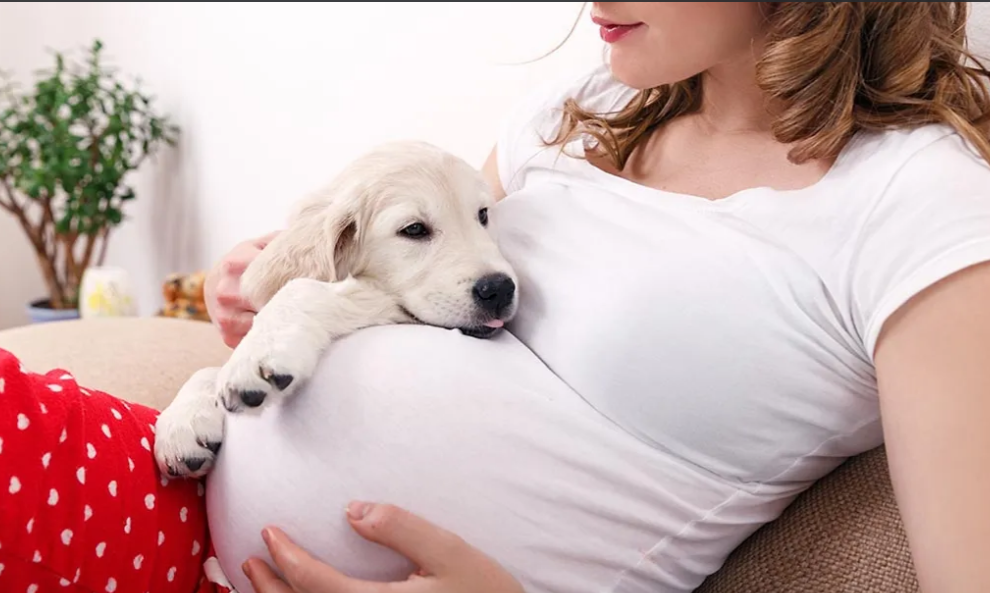Pets and Pregnant Women
Many people know that interacting with animals has a positive effect on our emotions.
There are even benefits of having dog or cat pets while you’re pregnant such as the ability to endure stress much easier, and suffering from insomnia and cardiovascular diseases less frequently.
Pets can also be more affectionate and protective of their owner when she’s pregnant, pets like dogs and cats do know when you’re pregnant.
Also, studies show that pregnant women who keep a dog or a cat in the house have a lower risk of developing pre-eclampsia in later terms (formerly called “Toxaemia”), which can lead to unfortunate outcomes for both mother and baby.
Is it Safe to be around Animals while Pregnant?
There are some animals you should avoid to some extent when you’re pregnant, such as rats and reptiles.
While you can be fine playing with your cat and dog pets while pregnant, you should keep your pets indoors, maintain proper hygiene, and get less exposure to their waste.
When you’re pregnant, you should be careful sleeping with your pets or kissing them, as interacting with them can cause some serious problems.
Risks of Keeping Pets around You when You’re Pregnant
Cats, dogs, birds, and other animals can be carriers of toxoplasmosis, which they almost always have in a latent form, and cats are the most common carriers of this pathogen.
While the odds of getting toxoplasmosis from cats or other pets while a woman is pregnant is small, you should put in place a precautionary measure like preventing your pet from hunting and eating fresh meat from outside.
You should desist from kissing your dog or cat while pregnant.
While you can still clean their litter box by wearing a mask and gloves when you’re pregnant, you should avoid cat and dog urine and feces in your third trimester of pregnancy.
During the third trimester, chances of contracting toxoplasmosis or other infections from pets and infecting your fetus with it are high.
Risks of Infections from Pets and Prevention while you’re pregnant
To protect yourself and the future baby, you don’t have to give away your pets to someone else.
Toxoplasmosis
The symptoms of toxoplasmosis include fever, weakness, and enlarged lymph nodes.
Not all symptoms present themselves, however, and it’s more likely to be taken for a mild cold.
Once you’re infected, the body develops a strong immune response against the pathogen so that re-infection won’t occur.
But during pregnancy, a dangerous infection can be transmitted from mother to fetus.
Infections could significantly increase the risk of damaging the nervous system and cause blindness and deafness.
You should have a toxoplasmosis test to detect any antibody, and pick up poop from the litter tray more often and only with rubber gloves on – or even better – Let another family member perform this duty.
And of course, you shouldn’t feed your beloved pet raw meat, and take them to the vet for a checkup.
Tapeworms (helminths)
Man’s best friend often has to walk outside, and they can easily catch an infection there.
The most common problem that dog owners may have is tapeworms (helminths).
The early symptoms of infection can easily be taken for morning sickness.
When a pregnant woman is infected with tapeworm, she may have increased salivation, loss of appetite, and vomiting.
Infection can cause premature birth or termination. Fortunately, in medical practice, fetal contamination with helminths is rare.
Cats, as well as dogs, need to be regularly dewormed and receive annual vaccinations against rabies and viral diseases.
Choriomeningitis Virus (LCMV)
Also, pregnant women should be aware of the lymphocytic Choriomeningitis virus (LCMV).
The main carriers of this virus are rodents. Moreover, not only can wild mice and rodents be potentially dangerous, but also domestic hamsters, guinea pigs, and rats.
Once the LCMV virus enters a pregnant woman’s body, it can lead to serious congenital malformations and cause the pregnancy to terminate.
Salmonellosis (salmonella)
Turtles and other kinds of reptiles are the most common carriers of salmonellosis (salmonella).
The main symptoms include nausea, vomiting, fever, and diarrhea.
The infection will not affect the fetus, but it could lead t dehydration of the mother’s body, which should never happen during pregnancy.
It could result in fetal blood supply impairment or even premature birth.
Like rodents, reptiles are not recommended to be kept at home during pregnancy.
And if for some reason that are not possible, then avoid touching them with your bare hands, and don’t let them walk freely around the house.
Also, make sure to wash our hands with soap after any interaction with them.
Developing Allergy
If you didn’t have a cat or a dog before pregnancy, then it’s best not to get one now that you’re expecting a baby.
During pregnancy, an allergy may develop in a woman’s body; and if it does not, you never know whether your newborn will have an allergy or not.
If it does happen then unfortunately, your beloved pet, which you have already gotten used to would have to be given to someone else.
Conclusion
Of course, there are cons to having a pet, but the joy and benefits of interacting with your favorite pets are irreplaceable.
For example, dog owners are forced to walk their pets daily; and walking in the fresh air can only be of benefit to the pregnant woman.
Stroking cats can help with a headache – they feel the energy coming from each organ; and if they find any imbalance, they will certainly help their owner to restore their healthy energy.
Additionally, contact with pets can improve mental health, and help deal with stress, depression, and other neurological disorders.
